Atlantic Monthly Contributors's Blog, page 389
July 17, 2015
An Attack on a U.S. Military Recruitment Facility
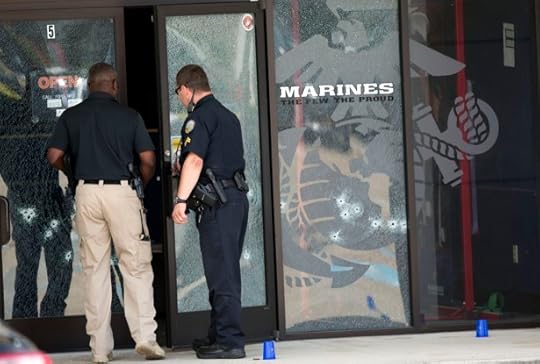
Updated 7/17/15 at 3:30 pm
A gunman opened fire at two military recruiting stations in Chattanooga, Tennessee, on Thursday morning, killing four U.S. Marines before dying in the attack. Three others, including one police officer, were wounded. According to Ed Reinhold, the FBI Special Agent in Charge, the Marines were killed at a recruitment center where the Air Force, Army, Navy, and Marines all share offices. President Obama described the attack as a “heartbreaking circumstance” while cautioning that “we don’t know all the details.” According to CBS News, U.S. Attorney Bill Killian said officials were treating Thursday’s attack as an “act of domestic terrorism.”
The gunman was identified as Muhammad Youssef Abdulazeez, 24, a naturalized U.S. citizen born in Kuwait. Abdulazeez had attended high school and college in Chattanooga, where he graduated from the local University of Tennessee campus in 2012 with a degree in electrical engineering. Described as “quiet and friendly” and with an interest in wrestling and mixed martial arts, Abulazeez had, in recent months, turned more toward Islam, growing a beard and attending weekly religious services. In two blog posts published on July 13, Abdulazeez commented on passages from the Koran—in one post, he writes that life is “bitter and short.” Dr. Azhar S. Sheikh, a founding board member at the Islamic center where Abulazeez worshipped, said that the young man nevertheless showed no signs of extremism.
The FBI, who is investigating Thursday’s shooting as an act of “domestic terrorism,” has not identified a motive for Abdulazeez’ act, and has commenced an investigation of his computer and phone records and bank accounts. A U.S. official told the Washington Post that in 2014, Abdulazeez traveled to Jordan, his ancestral home, and spent several months abroad—but it is unknown whether he made any contact with Islamic extremists during his stay.
Aside from a recent charge for driving under the influence, Abdulaezeez had no police record. According to law enforcement officials, his father was investigated by the FBI for donating money to a group with extremist ties, and was placed on a terrorism watch list before later being removed. However, officials cautioned, this past investigation of the father provided no information about Abdulazeez himself.
The violence in Tennessee represents the first attack on a U.S. military recruitment center since 2009, when Abdulhakim Mujahid Muhammad, a 23-year-old man unhappy about the wars in Iraq and Afghanistan, opened fire on two men standing near a recruitment center in Little Rock, Arkansas, killing one. Recruitment centers, by their nature, are open to the public, and Chattanooga’s Armed Forces Career Center had no additional security at the time of the attack.
On Friday, the family members and friends of the four victims began to publicly identify their loved ones. The Facebook page of India Battery, 3rd Batallion 12th Marines revealed that Sgt. Thomas Sullivan, a member, had died in Chattanooga. The 40-year-old Sullivan, a native of Springfield, MA, served two tours in Iraq. Also among the dead was Squire “Skip” Wells, a 21-year-old from Marietta, GA, who had just joined the Marines last year. The New York Times has identified David Wyatt of Burke, NC and Carson Holmquist of Polk, Wisc as the third and fourth to lose their lives.
In a statement released after the attack, Tennessee Governor Bill Haslam said that “lives have been lost from some faithful people who have been serving our country, and I think I join all Tennesseans in being both sickened and saddened by this.”
This story will be updated as new developments unfold.









Trainwreck Is a Comedy Smash

There’s an early gag in Trainwreck, the new comedy written by and starring Amy Schumer and directed by Judd Apatow, in which our protagonist, also named Amy, stumbles home with a new male conquest and watches him disrobe. When the fellow drops trou, she is both astonished and appalled at the extent of his manhood. “Your dick doesn’t end!” she exclaims.
Related Story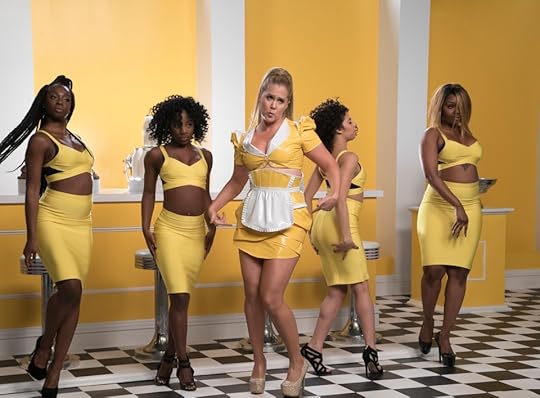
Amy Schumer and the Growing Pains of Comedy
I wasn’t sure when I saw the film (and I’m still not) whether this was a cunning bit of self-mockery: Apatow’s raunchy comedies have consistently been chided for their excessive length, and Trainwreck, which clocks in at just over two hours, is no exception. This is a movie from which 15 or 20 minutes could have been profitably trimmed.
Which is to say that my harshest critique of Trainwreck is that it offers too much of a good thing. This exquisitely rude rom-com is the most flat-out hilarious film to hit screens in many moons, a big-screen breakout for Schumer and a return to form for Apatow after the disappointment of This is 40. (I was, and remain, a committed defender of the oft-maligned Funny People.)
Following a prologue in which Amy’s father (Colin Quinn) explains to his young daughters the impossibility of monogamy by way of a child’s doll (“What if I told you this was the only doll you could ever play with for the rest of your life?”), we flash ahead 23 years to find the grownup Amy taking her dad’s advice to heart. Her encounter with the over-endowed paramour is merely one of a series of interchangeable one-nighters. Groggily waking up in one strange bed, she prays, “Please don’t be a dorm room, please don’t be a dorm room,” only to discover a reality almost as horrific: Staten Island. (Her shame-ride back to Manhattan, however, proves admirably shame-free, as she Titanic-poses on the guardrails of the Staten Island Ferry.) Amy does have one regular fella, the walking HGH-supplement Steven (a surprisingly funny turn by WWE star John Cena). But following her sublimely unsuccessful effort to coach him to talk dirty, it’s all downhill for that relationship.
This exquisitely rude rom-com is the most flat-out hilarious film to hit screens in many moons.
Amy works for a glossy magazine memorably titled S’Nuff, which under the leadership of its editor, Dianna (a gloriously wicked and glammed-up Tilda Swinton), specializes in articles such as “The S’Nuff Guide to Beating Off at Work” and “Ugliest Celebrity Kids Under Six.” But when Amy is sent out to write a feature on a charmingly nerdy, borderline-virginal sports doctor, Aaron (Bill Hader), she discovers to her great surprise that she rather likes him.
The narrative that unfolds from this premise is not a novel one, but Schumer’s caustic wit keeps the story on its toes. Even as we watch Amy and Aaron begin to fall for each other gauzily, Amy punctures the moment in voiceover, declaring, “I hope this love montage ends like Jonestown.” Several scenes (the magazine story pitch meeting, the bridal shower) are reminiscent of Schumer’s TV series, and the overall tone, while less political, is no less biting. There are sharp comic drive-bys of Willy Wonka, Keyser Söze, Kanye West, and Lifetime movies, as well as what is almost certainly the best Alex Rodriguez joke of all time.
Schumer herself is a magnificent mess as Amy, and Hader’s quirky likability has never been put to better use. And even beyond Swinton and Cena, the supporting cast is uniformly terrific: Quinn as Amy’s belligerent dad; Brie Larson as her settled-down younger sister; Vanessa Bayer as her co-worker and best friend; Dave Attell as the acerbic homeless guy who claims a chunk of sidewalk outside her apartment.
But perhaps the movie’s greatest surprise is the comic chops displayed by NBA god LeBron James, who plays a version of himself as Aaron’s patient and off-work buddy. (This may be the cleverest counter-self-portrait since Michael Cera’s coke-addled sex fiend in This is the End.) Schumer and Apatow deftly avoid saddling James with more than he can handle, and he nails the material he’s given—most of it revolving around his super-sized love for the city of Cleveland, his exceptional frugality, and his profound concern for Aaron’s romantic prospects.
The movie drags a touch in its final third (an “intervention” scene plays as exactly what it is: an unnecessary excuse for additional celebrity cameos) before coasting into a decidedly Apatowian happy ending. The director has always deployed dirty jokes in the service of conventional values—monogamy, parenthood, marital perseverance—and a number of critics have already faulted the film for its lack of cultural daring in this respect. (I confess that I’m not entirely convinced this is a bad thing.) Is Trainwreck essentially a gender-inverted variation on Knocked Up? Sure it is. But that in itself represents progress.
In any case, this is a film that belongs not to its director but to its star, who, if there is any justice in the world, is about to ascend from cult icon to mass phenomenon. Schumer will almost certainly have many opportunities to deploy her edgy wit toward edgier ends. I can hardly wait.









July 16, 2015
Twenty-Four Counts of Murder in Aurora
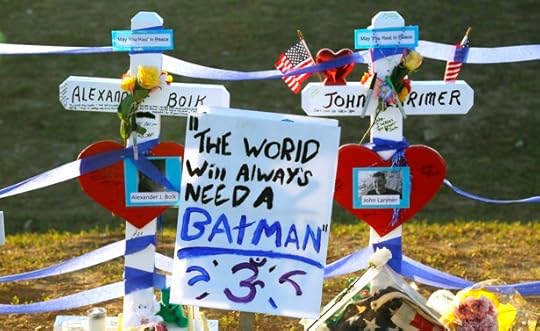
On Thursday, hours after a shooter killed four Marines in Chattanooga, Tennessee, a Colorado jury found James Holmes guilty of multiple counts of murder in the 2012 massacre at a movie theater in Aurora, Colorado.
These developments, while not materially linked, come at a moment when gun violence in the United States is a dominant thread in the national discourse. Last month, after nine people were killed in a church shooting in Charleston, South Carolina, President Obama delivered his sharpest words yet about the tide of mass shootings in the United States.
The Aurora shooting is among the most horrific attacks in recent memory. A packed midnight showing of The Dark Knight Rises in the suburbs of Denver. Twelve moviegoers dead, and 70 injured. Over 250 witnesses testified in the trial.
Holmes’ attorneys had argued that their client had suffered from mental illness. Writing in The Atlantic, Andrew Rosen noted that a preliminary hearing in 2013 included details about how Holmes hadn’t fled the scene of the crime and “meekly” handed himself over the police when they arrived. The jury rejected Holmes’ claim.
Holmes, 27, will be eligible for the death penalty, which seems to be what the state is pursuing: According to The New York Times, George Brauchler, the district attorney, has previously said that “justice is death.” Court documents also show that Holmes’ lawyers sought a plea deal that would have sent Holmes to prison for life, but the prosecutors rejected it.
That would spare the public the spectacle of a trial and the possibility of years of appeals. As Robert Wright argued in The Atlantic, one possible way of punishing killers who may be seeking notoriety is to keep them obscure.
The trial will now shift to the sentencing phase, which is expected to last weeks.









Super PACs Are for Republicans, Campaign Cash Is for Democrats
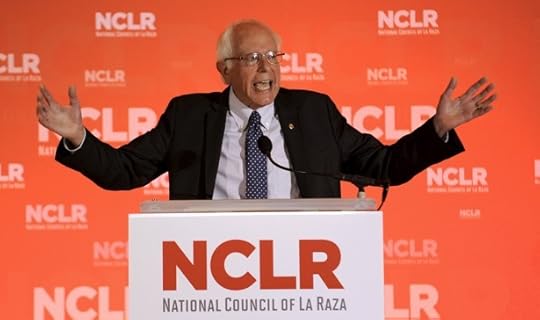
Here’s perhaps the most peculiar statistic from the latest round of Federal Election Commission filings: Bernie Sanders’s campaign for president has raised more money than any Republican candidate’s campaign. That’s right—his $15.2 million haul is more than even the $11.4 million Jeb Bush’s organization has pulled in. Only fellow Democrat Hillary Clinton’s breathtaking $47.5 million beats it (and more than quadruples Bush’s take).
As you may have guessed, there’s an asterisk. Pretty much any tally places Jeb Bush ahead of the rest of the entire field with more than $114 million, thanks to the nine-digit total that Right to Rise, the super PAC supporting him, brought in. It’s no secret that Republicans embraced the post-Citizens United world of super PACs faster than Democrats, but the filings released this week are the most important demonstration of that fact and how it’s likely to play out in this election. (The New York Times has a great tally.)
During the 2012 campaign, President Obama reluctantly and tardily embraced a super PAC created to back his campaign. He had been critical of the new landscape of campaign funding, but decided it was essential to compete with Mitt Romney. Hillary Clinton seems to be offering a modified version of that approach: She called for a constitutional amendment to reverse Citizens United, but she has also been faster to embrace the aid of Priorities USA—the same super PAC that backed Obama—in the 2016 election. Sanders, a longtime campaign-finance reformer, has ruled out super-PAC support.
Related Story
GOP Candidates Discover the Problems With Money in Politics
Priorities has raised a decent sum toward Clinton’s effort—$15.6 million, which is more than what several Republican candidates’ super PACs have. It’s also less than several others. Priorities has struggled to get its fundraising on track, and has dealt with some internal personnel turbulence. Priorities will continue to fundraise, and Clinton is also sure to benefit from major outside expenditures from unions. But she seems to be on track to run a traditional campaign, with most functions centralized in her Brooklyn office.
That forms a sharp contrast with Bush, whose super-PAC fundraising vastly dwarfs his campaign cash (and also easily passes the $100 million mark some speculated he wouldn’t make by July 1). Bush has effectively decided to farm out many of the traditional functions of a campaign to Right to Rise. Most notably, longtime strategist and close confidant 








An Attack on a U.S. Military Recruitment Facility

Updated 7/16/15 at 6:19 pm
A gunman opened fire at two military recruiting stations in Chattanooga, Tennessee, on Thursday morning, killing four U.S. Marines before dying in the attack. Three others, including one police officer, were wounded. According to Ed Reinhold, the FBI Special Agent in Charge, the Marines were killed at a recruitment center where the Air Force, Army, Navy, and Marines all share offices. President Obama described the attack as a “heartbreaking circumstance” while cautioning that “we don’t know all the details.” According to CBS News, U.S. Attorney Bill Killian said officials were treating Thursday’s attack as an “act of domestic terrorism.”
The gunman was identified as Muhammad Youssef Abdulazeez, 24, of Hixson, Tennessee. Federal officials said that he was not under investigation at the time of the attack.
The violence in Tennessee represents the first attack on a U.S. military recruitment center since 2009, when Abdulhakim Mujahid Muhammad, a 23-year-old man unhappy about the wars in Iraq and Afghanistan, opened fire on two men standing near a recruitment center in Little Rock, Arkansas, killing one. Recruitment centers, by their nature, are open to the public, and Chattanooga’s Armed Forces Career Center had no additional security at the time of the attack.
In a statement released after the attack, Tennessee Governor Bill Haslam said that “lives have been lost from some faithful people who have been serving our country, and I think I join all Tennesseans in being both sickened and saddened by this.”
This story will be updated as new developments unfold.









Progress Comes to the Emmys, Slowly

Progress comes slow to any awards body, and the Emmys are no different. After a 2014 ceremony that handed trophies to scores of familiar faces, it was nearly impossible for this year’s nominees to feel quite so dull.
With a handful of rule changes and a general sense of acceptance that Internet-based TV isn’t going anywhere, Thursday’s announced nominees included acclaimed niche shows like Amazon’s Transparent and Netflix’s Unbreakable Kimmy Schmidt, while creaky ratings-winners like The Big Bang Theory fell off the map. This year’s Emmy nominees embraced progress by recognizing TV’s ever-growing landscape, but at the cost of major recognition for network television’s newfound focus on diversity.
Related Story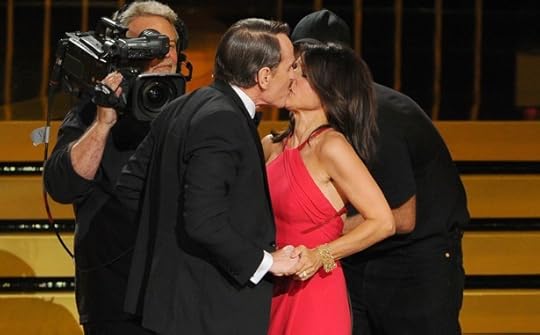
The television landscape is undergoing its second enormous sea change in 15 years. When HBO entered the primetime drama scene with The Sopranos in 1999, the Emmys were slow to acknowledge the new high-quality output from premium cable, giving the show its first Outstanding Drama Series trophy in 2004, for its fifth season. Since then, cable has dominated the drama categories, but less so in comedy (where a cable show has won Outstanding Series only once—Sex in the City in 2001). Meanwhile, cable offerings have become even more diffuse, other networks like AMC and FX have entered the scene as heavyweights, and streaming series have become a serious force. Netflix’s House of Cards and Orange Is the New Black were all over this year’s nominees list, but one of TV’s most critically popular and highly viewed shows, Fox’s Empire, got only one major nod.
It’s a curious situation—though the Emmys should be commended for acknowledging the wide landscape of quality TV available online, the awards seem to have lost interest in the kind of primetime network dramas that would have been mainstays in the 1980s and ’90s. Lee Daniels and Danny Strong’s music-business drama Empire debuted to soft reviews but great ratings in January, and its word of mouth quickly built as viewership exploded, making it the kind of phenomenon the Emmys would have previously been loath to ignore. This year, only its lead actress, Taraji P. Henson, was recognized. Similarly, Shonda Rhimes’s ABC drama How to Get Away With Murder was the kind of ratings bonanza network TV supposedly can’t count on anymore, but was only nominated for lead actress (Viola Davis) and guest actress (Cicely Tyson).
Those nominations gave the 2015 ballot more diversity considering how depressingly poor the Emmys have been at recognizing lead actors of color over the years. Black-ish’s Anthony Anderson, Unbreakable Kimmy Schmidt’s Tituss Burgess, Getting On’s Niecy Nash and Key & Peele’s Keegan-Michael Key were other encouraging first-time nominees, although they all came in the comedy categories. That side of the Emmys is undergoing a serious revamp—though ABC’s consistent hit Modern Family is still collecting nods, there’s a lot of newer blood such as the aforementioned Transparent, Black-ish, and Comedy Central’s Inside Amy Schumer. With the Emmys, the first nominations are often the hardest: Once you’re a known quantity with voters, it’s easy to come back for more next year.
The awards seem to have lost interest in the kind of primetime network dramas that would have been mainstays in the 1980s and ’90s.That phenomenon is perhaps most observable in the major drama categories, where a lot of long-running shows near the end of their lives still reign supreme. AMC’s Mad Men, a four-time winner for Outstanding Drama Series, will make its eighth and final run at trophies next year, likely gunning for acting trophies its cast have never claimed (Jon Hamm, Elisabeth Moss, and Christina Hendricks have never won). PBS’s Downton Abbey is a long distance from its years as a critical favorite, but still managed three major nominations. HBO’s Game of Thrones, Showtime’s Homeland, and Netflix’s two shows are all familiar faces, and the only new series nominated was AMC’s Better Call Saul, a spinoff of last year’s winner, Breaking Bad.
There are bright spots to be found in almost every category. After years of acclaim for a show where she plays six major characters (all clones of each other), Tatiana Maslany got her first nomination for BBC America’s Orphan Black. After winning in the Guest Actress category last year, Orange Is the New Black’s Uzo Aduba successfully graduated to Supporting Actress after a rule change tightened the Academy’s stance on category eligibility. That, too, was the reason for Orange Is the New Black’s shift from the comedy to drama category, where the show has proven it can stand toe-to-toe against grimmer, male-dominated premium dramas.
These signs of progress may not extend to the Emmy winners when they’re announced on September 19th. It would hardly be surprising if voters, confronted with a wider pool of talent (most categories have expanded to seven nominees), opt for the familiar in Mad Men and Modern Family. But hopefully, the network television shows that embrace diversity while emphasizing quality will eventually end up being rewarded.









The Rhetorical Flair of Greece's Prime Minister

Less than two weeks ago, as Greek voters were preparing to participate in a referendum on whether to accept the conditions of a third bailout from Europe, Greek Prime Minister Alexis Tsipras delivered a speech. In it, he urged Greeks to reject "ultimatums, blackmails, and the campaign of fear" he said European creditors were waging and vote against a measure that would call for Greece to reform its pensions system and raise its taxes. Voters seemed to listen, and voted overwhelmingly against it. A day later, Syntagma Square, the central square of Athens, was a veritable carnival in tribute to Tspiras and his anti-austerity Syriza party.
On Thursday, ahead of a different vote on a quite similar plan, Tsipras gave another speech, this time to Greece’s parliament.“I was blackmailed, there were no good options and I chose the least bad. The MPs should recognize this and accept the same choice,” Tsipras said. “The government does not believe in these measures. We will do our best to protect people from measures we do not believe in but are forced to implement.”
With the exception of parts of of Tsipras’s own party, Greece’s parliament seemed to listen and voted overwhelmingly in favor. The night before the session, Syntagma Square was afire from Molotov cocktails and clouded by tear gas fired by riot police to keep violent protestors at bay.
Meanwhile, Tsipras has managed the rhetorical feat of convincing voters to reject a plan, and convincing legislators to embrace a similar one, mainly by saying the same thing: Europe is being unfair and we will fight. Only the definition of “fight” has really changed.
The prime minister’s rhetorical chops were also on display in his victory speech after his party won elections in January, when he dispatched a little Greek mythology to dismiss those who predicted doom for Greece under the leadership of his left-wing, anti-austerity party.
Friends, the new Greek government will prove all the Cassandras of the world wrong. [There will be] no mutually destructive clash. … We have a great opportunity for a new beginning.
As the writer Shiv Malik noted at The Guardian, the problem with the speech was that “Cassandra was ALWAYS right.” While Greece seems set to remain in the euro zone for the time being, the last few months have often seemed to veer toward a “mutually destructive clash.”
It would be difficult enough being prime minister of Greece if the country’s problem was only that half or more of Greeks under the age of 25 are out of work. Or that long-term unemployment has hit 20 percent. Or that its per capita GDP has plummeted.
GDP Per Capita Since 2005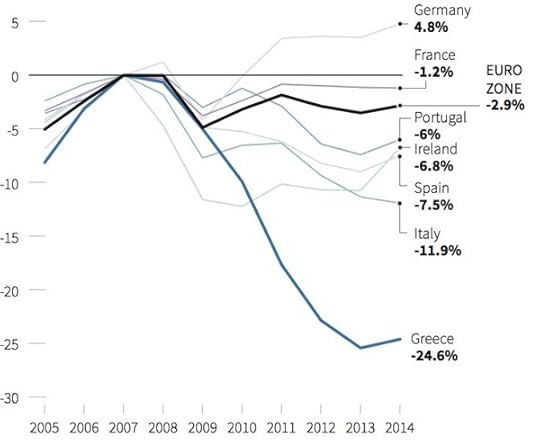 Reuters
Reuters But the banks have now been closed for two and a half weeks. Workers across a number of industries are striking. And Tsipras may face new elections if his ruling coalition falls, which after last night, it may.
The good news is that after Thursday’s vote, the European Central Bank promised to raise the ceiling on emergency lending to Greek banks to $989 million, meaning that the banks may open again soon and that Greece probably won’t crash out of the euro zone for now. But that may be about it for the good news.









Can a Lawsuit Stop Chinese Aggression?

Earlier this month, a petition emerged at change.org with an unusual request for Google: arbitrate a naming dispute between the Philippines and China. Until recently, Google Maps had labeled a small shoal claimed by both countries as Zhongsha, the Chinese name, rather than Panatag, the moniker preferred by Filipinos. On Tuesday, Google rechristened the reef with its English name: Scarborough Shoal.
The dispute over what to call the Scarborough Shoal isn’t just a minor squabble. It echoes a lawsuit playing out on a much larger scale. Last week, an Arbitral Tribunal gathered in The Hague to determine whether China’s vast maritime claims in the South China Sea, where the shoal is located, violate international law. The case, first filed by the Philippine government in 2013, will have implications beyond questions of sovereignty in Asia. The tribunal’s decision will bear on a larger question: Can an international institution stop a rising power from doing what it wants?
The Chinese government defines its maritime claims as all the water encompassed by a “nine-dash line” that encircles Taiwan and hugs the coastlines of the Philippines, Malaysia, Brunei, and Vietnam. The line—which China claims dates back to the 1940s—is not recognized by any other state or international institution, and for decades the Chinese government did little to enforce it. But as China has grown stronger, the country has begun to enforce its sovereign claims, constructing artificial islands near the disputed Spratly Islands and establishing an oil rig off Vietnamese shores. These moves have given the country de facto control over sea lanes crucial to international trade, access to abundant fish stock, and possession of water potentially rich in natural resources.
China’s incursions have drawn resistance from neighboring countries. In 1999, the Philippines stationed a rusted naval ship, the BRP Sierra Madre, along a submerged shoal disputed by Manila and Beijing, and since then the Philippines has garrisoned a small number of troops there. But no country in the region possesses the military strength to deter Chinese activity there, and Beijing has been able to carry out its maritime policy with impunity.
Lacking a military alternative, the Philippines have turned to international law. The United Nations Convention on the Law of the Sea (UNCLOS), ratified by Manila in 1984 and Beijing in 2006, grants each maritime country an exclusive economic zone within 200 miles of its shoreline—a designation that China has largely ignored in recent years. Rather than simply ask the tribunal in The Hague to settle a bilateral territorial dispute, the Philippines is instead seeking to render China’s “nine-dash line” null and void. Will the gambit work?
Probably not. China has dismissed the legitimacy of the tribunal entirely, instead preferring to negotiate with the Philippines directly. And even if the judges in The Hague rule in the Philippines’ favor, which is no sure thing, the tribunal lacks any enforcement mechanism to compel China to comply with its decision. The Chinese government, in any case, has said that it will continue to do what it wants regardless of the decision.
Which is not to say that the case won’t have consequences. If the Philippines loses, the country and its neighbors will be less likely to turn to international institutions to resolve future disputes, and military alliances will become more attractive. Heightened tension in the South China Sea will increase the chances that the region’s other superpower—the United States—intervenes more forcefully on behalf of China’s adversaries. Finally, the tribunal’s decision will determine whether UNCLOS, a crucial piece of international legislation, has lost its reason for being—and show that the law of the sea may more closely resemble the law of the jungle.









Israeli Opposition Leader: Iran Deal Will Bring Chaos to the Middle East
 Last December, when I interviewed the leader of Israel’s left-leaning Labor Party, Isaac “Bougie” Herzog, at the Brookings Institution’s Saban Forum, he said, in reference to nuclear negotiations with Iran: “I trust the Obama administration to get a good deal.”
Last December, when I interviewed the leader of Israel’s left-leaning Labor Party, Isaac “Bougie” Herzog, at the Brookings Institution’s Saban Forum, he said, in reference to nuclear negotiations with Iran: “I trust the Obama administration to get a good deal.” In a telephone call with me late last night, Herzog’s message was very different. The deal just finalized in Vienna, he said, “will unleash a lion from the cage, it will have a direct influence over the balance of power in our region, it’s going to affect our borders, and it will affect the safety of my children.”
Iran, he said, is an “empire of evil and hate that spreads terror across the region,” adding that, under the terms of the deal, Iran “will become a nuclear-threshold state in a decade or so.” Iran will take its post-sanctions windfall, he said, and use the funds to supply more rockets to Hezbollah in Lebanon, more ammunition to Hamas in Gaza, and “generally increase the worst type of activities that they’ve been doing.”
Related Story
The Single Most Important Question to Ask About the Iran Deal
Herzog, who lost a race for the prime ministership in March to the Likud’s Benjamin Netanyahu, had mainly kind words for his archrival, and he even invoked an expression popularized by Netanyahu’s ideological guide, the founding father of right-wing Zionist revisionism, Ze’ev Jabotinsky, to describe what he sees as Israel’s next, necessary step: “We have to build an iron wall to protect Israel. There are clear risks to Israel’s security in this deal.”
The Iran deal represents one of those rare issues that has unified Israelis of most political parties. Herzog and Netanyahu agree on very little—not on a whole basket of social and economic issues, and certainly not on the need for territorial compromise to advance the cause of a two-state solution with the Palestinians. But Iran, Herzog told me, has Israelis—of the “left, center, and right,” he said—frightened.
Netanyahu appears eager to bring Herzog, the official head of the Israeli opposition in the Knesset, into his government as foreign minister. This makes good sense from Netanyahu’s perspective—he knows that he has burned bridges with the Obama administration, and he needs an interlocutor who could gain access to the West Wing. Herzog wouldn’t tell me the status of his talks with Netanyahu, though he said he believed he could do a more effective job critiquing the Iran deal from outside the government. And this is where things gets complicated: When I asked Herzog if he would be lobbying Congress to disapprove the deal (AIPAC, I’m told, has invited him to do so), he said he wouldn’t. “I think it’s a bad deal, but I’m not going to lobby, I’m not going to tell senators what to vote. I think what I need to do is explain the weak points and have them understand our concerns. I’m taking the practical approach.”
Isn’t that a description of lobbying? “I don’t intend to hide my feelings. Most of the Israeli body politic is worried about the agreement, and people need to understand our worries. The world doesn’t fully understand the fact that we are left here alone in this neighborhood, that there is a Shia empire that is trying to inflame the region with a heavy hand. But I don’t intend to clash with the administration. We’re very glad for all that the Obama administration has done for us. We have respect for the United States, for this great ally and friend, and we don’t want to be in a confrontation or clash. But we have to let people know that we think this is a dangerous situation.”
“We have to build an iron wall to protect Israel. There are clear risks to Israel’s security in this deal.”Herzog’s militancy on the subject of the deal places the Obama administration in an uneasy position. While the administration can—and has—dismissed Netanyahu as a hysteric, the eminently reasonable Herzog, who is Secretary of State John Kerry’s dream of an Israeli peace-process partner, will find receptive ears among Democrats for his criticism. Herzog’s critique of the deal also places American Jewish organizations in a curious dilemma. It will be fraught for liberal Jewish organizations to endorse the Vienna agreement if both the right-wing government in Jerusalem, and its center-left opposition, are so vehemently opposed to it. (The only major Jewish organization to line up with the Obama administration so far is J Street, which describes itself as “pro-Israel and pro-peace,” but which is keenly interested in advancing Obama administration interests, whether or not Israelis agree with them. “Our No. 1 agenda item,” its founder, Jeremy Ben-Ami, once said, “is to do whatever we can in Congress to act as the president’s blocking back.” Herzog, J Street’s natural ally in Israeli politics on matters of the peace process, is putting the group in an uncomfortable position. It can’t be easy to be a self-described pro-Israel group that is lobbying for a deal that the large majority of Israelis loathe.)
Herzog would not tell me when he’s arriving in Washington to launch his non-lobbying lobbying campaign, but I expect he will arrive soon, and I expect that he will find himself the target of a great deal of lobbying as well; from the administration’s perspective, Netanyahu is a permanent adversary, but Herzog is a respected friend—one who could do damage to the administration’s cause on Capitol Hill, if he so chooses.









How F.A.O. Schwarz Ushered Kids Into the Class Wars

F.A.O. Schwarz, one of the oldest toy stores in the United States, is best known as the whimsical setting for the piano scene in the movie Big:
That piano, now, is no more. This week, citing the high cost of commercial real estate in New York City, F.A.O. Schwarz—“as much of a must on any tourist’s itinerary as Tiffany & Co. or Bergdorf Goodman” according to Fortune—closed the doors of its flagship store, across from The Plaza Hotel on Fifth Avenue. Schwarz continues its sales online, and there’s a chance, its current owner, Toys ‘R’ Us, has said, that it will open a brick-and-mortar operation in another, slightly cheaper, location. For now, though, that piano has been packed up. And so has, with it, Big’s easy symbolism: that the basic ideas toys represent—a sense of wonder, a sense of play, a sense that the world serves primarily as a backdrop for fun—can endure into adulthood. That childhood isn’t so much a stage as, yes, a state of mind.
But F.A.O. Schwarz, outside of Hollywood, didn’t simply sell stuffed animals and dolls and model trains and other such traditional tools of childhood. That Toys ‘R’ Us bought the legendary company, in 2009, represented something of a downgrade for Schwarz, and that was largely because “us” implies an inclusivity that ran counter to the Schwarz brand. The store, instead, was best known for bringing the tenets of the “luxury good” to the toy market—for selling what CNN once called, simply, “pricey toys for rich kids.”
That was an understatement; the toys on offer, particularly in recent years, weren’t just “pricey,” they were downright Trumpian. There was the $15,000 mini-Mercedes, gas-powered, with room for two children in its tiny seating area. There was the $30,000 off-road vehicle, designed, Schwarz said, to give kids “their first driving experience.” There was the treehouse that came complete with its own tree ($12,000; “gift wrap,” unfortunately, “not available”). There was the $9,000 “rocking zebra.” There was the customized playhouse called “La Petite Maison,” which had a starting price of $30,000, but rose in price according to its size, its architectural details, and the furnishings deemed fit for it by a “professional children’s interior decorator.”
 A boy poses with his sweet ride in the 2004 edition of the F.A.O. Schwarz catalog. (F.A.O. Schwarz)
A boy poses with his sweet ride in the 2004 edition of the F.A.O. Schwarz catalog. (F.A.O. Schwarz) Toys, sure, have long been fashion items—for parents as much as, and sometimes more than, children. Playthings, objects on display both at home and in public, have long allowed for moms and dads (and also doting friends and relatives) not just to give commercial expression to their love for the kids in their lives, but also to demonstrate to others just how deep that love is. Toys, like most anything else one can purchase from a multi-level emporium on Fifth Avenue, have long been enablers of conspicuous consumption.
Toys have also long had, however, an educational function. Dolls, in particular, have served to model behavior for their young owners, whether that behavior involves parenthood or siblinghood or more general personhood. Barbies, G.I. Joes, Cabbage Patch Kids, Transformers, American Girls, stuffed animals—they teach caring and companionship, all cozily conscribed within a particular, doll-defined set of rules and expectations. Train sets and Legos and K’nexes and all the other manifestations of building blocks do similar work when it comes to modeling the world’s material workings. Toys, of whatever category or brand, ultimately distill the realities of the adult world—physical, commercial, social—into easy, kid-friendly approximations. Into, in other words, games.
F.A.O. Schwarz, with its spate of high-end offerings, simply took all of that Piagetian logic to its logical extreme. “When children are used to living well,” the brand’s 2004 catalog explained, “they should play like this.”
And they should, in the process, the catalog suggested, prepare themselves for the particular obligations that come with privilege—not in the great power/great responsibility kind of way, but in the purely commercial way. Schwarz’s toys were not just toys, but also helpful primers for planned-upon lives of wealth. They were playthings that doubled as performances, instructing the kids who owned them in often unspoken and yet often all-powerful modes of luxurious living. (They should play like this.)
The code, unsurprisingly, included heavy gendering. For girls, Schwarz offered a $950 pavé diamond bracelet that billed itself, entirely unironically, as “starter jewelry.” (It also offered an Etch-a-Sketch re-imagined as “the ultimate display piece,” the toy featuring “over 10,000 dazzling handset sapphire Swarovski crystals.”) For boys, there was a life-size model of the NBA superstars Jason Kidd and Allan Houston, made of Legos ($15,000). There was also a dinosaur-themed ball pit nicknamed, inexplicably but revealingly, “I’m the Boss.”
In that sense, it is hard to mourn the closing of F.A.O. Schwarz. Particularly because its ethos—whether via a Mercedes Benz G55, recommended for children ages 3 to 7, or via all the similar toys that teach children not just about caring and community, but class—lives on. As Toys ‘R’ Us put it when it announced the closing of its flagship store, “The company is committed to the F.A.O. Schwarz brand and growing its legacy.”









Atlantic Monthly Contributors's Blog
- Atlantic Monthly Contributors's profile
- 1 follower



